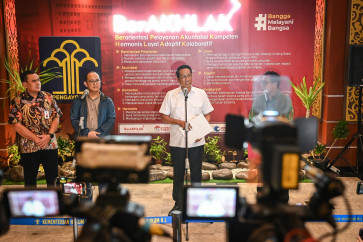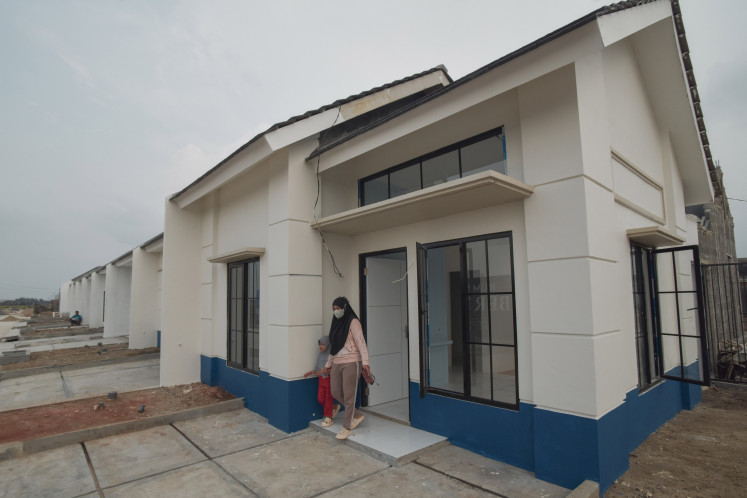Popular Reads
Top Results
Can't find what you're looking for?
View all search resultsPopular Reads
Top Results
Can't find what you're looking for?
View all search resultsInsight: The risk of convenient alternatives: A mining story
Lawyers invented the beautiful structure of the nominee contracts in order to allow foreigners to conduct activities they are legally not supposed to do
Change text size
Gift Premium Articles
to Anyone
L
awyers invented the beautiful structure of the nominee contracts in order to allow foreigners to conduct activities they are legally not supposed to do. The deal calls for the granting of a loan to an Indonesian national or company, in exchange for a complex array of security documents. Management control of the Indonesian company is achieved through a Technical Assistance Agreement. Shareholders are kept at bay by the Pledge of Shares, with or without irrevocable powers of attorney to vote the pledged shares. Nominee contracts maintain stability, law and order, until the shareholders’ children come home with foreign degrees to take over their fathers businesses.
Or large expenses, not provided for in the contracts are demanded by the nominee. Expatriate technical assistants are replaced, and the chemistry of relationships built over time are changed. Tensions increase and conflicts flare up. Occasionally we get a glimpse of clashes such as these from court records. It is not a pleasant read. Mind you, disappointed Nominors, the parties appointing the Nominees, were advised that, unlike the case in Anglo-American legal systems, Civil Law systems do not support the separation
between legal ownership of shares from the beneficial rights in the shares. Company law provides that if one is registered on the share registry as the owner of shares, one is also entitled to all rights attending to such shares, including the right to vote. If the right to vote is assigned to a lender, or if shares are pledged to the creditor, the shareholder is bound by contract to abide by it. However, if he votes in contravention of his contract, the lender only has a cause of action against him under contract law. The nominee’s vote, however, remains valid under company law. Nothing can come in between shares and their owners’ rights, not even beautiful legal structures such as nominee contracts. They are convenient subject to ceteris paribus, that is the assumption that everything else remains the same as when the contracts
were made.
The mining sector knows of such structures of convenience. They are called Cooperation Agreements. In the long stalemate between investors and the Government caused by the 8th Generation Contract of Work (CoW), the structure is said to have become increasingly popular among foreign investors. Typically the foreign investor comes in through the Capital Investment Board’s (BKPM) approval to a Foreign Capital Investment company (PT PMA) for engaging in Mining Services Activities. Notably BKPM approval is given in the name of the Energy and Mineral Resources Minister. The PT PMA then proceeds to enter into Cooperation cum Investment Agreements with Indonesian companies (PTs) which have been granted mining permits (KPs) in certain mining areas. These PT PMAs do all of the mining work for the 100 percent Indonesian-owned mining PTs in return for control over the KP holding PTs. In exchange for control the PTs receive royalty or regular lump sum payments. In short, the arrangement looks like an updated version of the classical ali-baba venture. Ali, the Indonesian party receiving Government favors, sits back and relaxes with a steady income, while baba, a reference to the non-local
entrepreneur, operates his business.
Much like the nominee contracts, the Cooperation and Investment Agreement will proceed smoothly in calm waters. Many established firms have put their stamp on such deals on the theory that it is a win-win arrangement for the local KP holder, the Republic of Indonesia, and the foreign investor. Moreover, on the legalistic scene of the Indonesian legal system none of the contracts entered into were prohibited. There is even the view that it had the mining authority’s approval, albeit tacitly. The view had credibility because of the bureaucracy’s apparent unease with the unprecedented absence of mining investment during such an extended period of time. The deal, however, carries more risks than the Nominee Contracts. Loan agreements between companies, including their security documentation, are common practice
everywhere.
Under documentary scrutiny the real deal remains invisible under the protection of a debtor-creditor relationship. Not so with the Cooperation and Investment Agreement documents. The purposes of a PMA company, which have received the approval of BKPM/Mining Authorities, have been violated because the approved service company was used as an investment vehicle. The amount of real investments made has considerably exceeded the investment reported and allowed under the BKPM permit. Such investments would not find it easy to fit within the definition of protected investment of Bilateral Investment Treaties. They would not be protected because they have not received admittance under the Foreign Capital Investment Law. Also, the company’s articles of association must have contained Objectives and Purposes clauses which would most likely limit its activities to mining services, not mining activities. Conducting activities that may be constructed as mining would be beyond its corporate authorization, and therefore susceptible to nullification actions.
Deals made before 2009 would be governed by the old mining law. Coming out from Indonesia’s left-oriented Old Order, Law No. 11/1967 had to underline its nationalist core. Its articles stress again and again the exclusion of foreign parties from mining activities outside the ambit of the Contract of Work. KPs are to be exclusively granted to 100 percent Indonesian-owned entities. There is also the prohibition of a transfer of the KP to other parties outside the 100 percent Indonesian entities listed on the companies’ shareholders register. A worst-case scenario could be the construction of a criminal act on the part of the foreign investor who carries out mining activities without itself owning a KP. A disgruntled KP holder may threaten to disclose to the authorities that the investor-operator does not have a KP, and therefore has illegally conducted mining activities. Article 34 Section (2) of the old law declared such conduct a criminal act.
As an epilogue to the mining story it has now been established by government regulation that the convenient alternative described as Cooperation and Investment Agreement contracts are prohibited. The prohibition only proves its widespread practice. Indicative of the inter-departmental tendency to shift the blame of mismanagement to others, the authority granted to the BKPM to approve investments in the mining services sector was revoked. Rising populist rhetoric on display pending the 2014 elections may force reluctant mining technocrats to enforce the prohibition. Local party operators, however, thirsty for campaign funds, might also force a compromise between KP holders, investors and the district heads, in exchange for cash contributions. It’s a mess, nothing new.
The Cooperation and Investment arrangement will fare smoothly under peaceful conditions. But senseless populism will always be a stirrer of peace and stability. By now investors must have begun consulting their respective counsel on how to cautiously renegotiate their arrangement with as little fanfare as possible. They may come up with more secure linkages, or advise dismantling the structure, and meticulously follow the vague mandates of the new law. It also looks as if counsels have begun brushing up their international law skills in order to better protect their clients.
The writer is OF Counsel to the law firm of Makarim & Taira S. The opinions expressed are his own.










